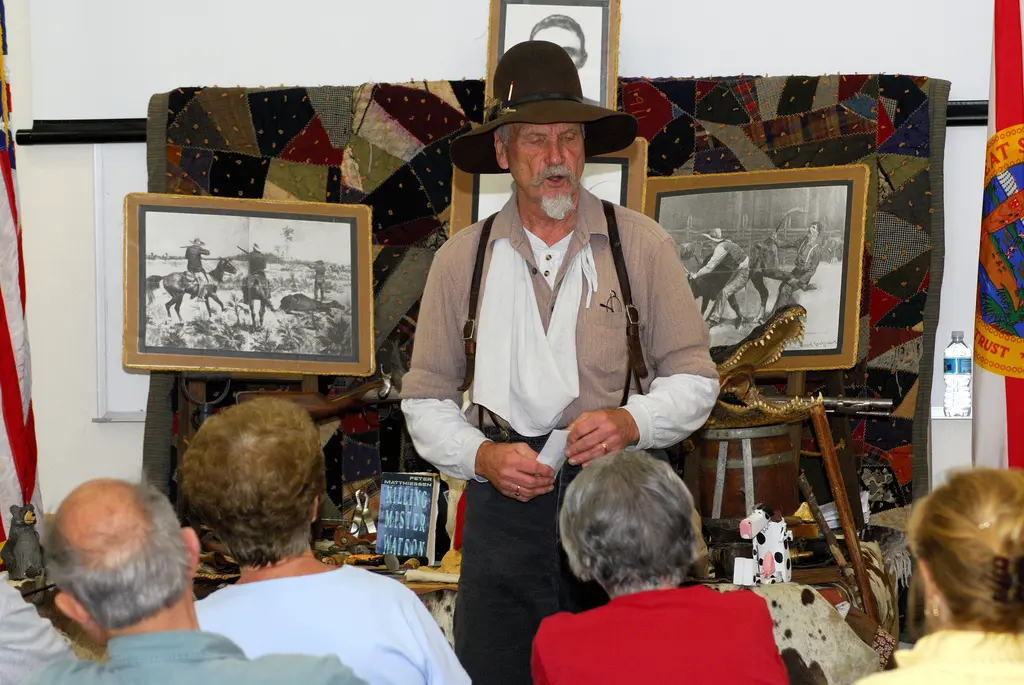Hank Mattson is known as the “Cracker Cowboy Poet” who “tells it like it was.”
A native of Lake Placid in Highlands County, Mattson recites his poetry and discusses Florida’s pioneer culture at libraries, schools, and festivals throughout the state.
“When This Old Hat Was New” is a poem Mattson wrote about Jacob Summerlin’s life as a Florida cowman in the 1800s. Appalachian folk musicians Dana and Susan Robinson set the poem to music, and it earned the 2015 Will McLean Best New Florida Song Contest, selected first out of 42 entries.
Mattson’s poetry tells the stories of colorful characters from Florida’s pioneer past such as Jacob Summerlin, Bone Mizell, and Hamilton Disston, but much of it is also based on his own experience as a “Cracker cowman.”
“I don’t ride much anymore, but there was a day when I did,” says Mattson. “Some places they round up cattle nowadays with ATVs and the like, but on the place where I work, and there are a whole lot of others, where you can’t get those things. We still use dogs and horses as they did years ago, and you’re never gonna get away from that.”
When Mattson performs his poetry, he surrounds himself with interesting Florida artifacts and Cracker Cowboy equipment including a Civil War era McClellan saddle, branding iron tools, emasculating tools, de-horning tools, and pliers for stringing wire on fences.
Until Florida passed a “fence law” in June, 1949, Florida cattle were allowed to roam free. As the population of the state grew in the early twentieth century, automobiles and trains were having more frequent encounters with cattle congregating on roads and tracks.
“I was 11 years old when Florida passed the fence law,” says Mattson. “Before that, if they hit your cattle, they paid you for it. Now if a cow gets out, it’s our fault. We have to pay for the damage to the car. So things have changed.”
In his public presentations, Mattson recites his poem about the origin of the word “Cracker.” He explains that the term goes back to the William Shakespeare play “The Life and Death of King John.” In Act II, Scene I of that play, the Duke of Austria says, “What cracker is this same that deafs our ears with this abundance of superfluous breath?”
“He was speaking about Scotch-Irish folks, and that’s where it started from,” says Mattson. “When they came over here, the name ‘Cracker’ came with them.”
Although the Duke in Shakespeare’s play found the talk of the “crackers” tiresome, the original meaning of the term is less judgmental. “It’s a derivative of the Gallic word ‘craic,’ which means interesting, educational conversation,” says Mattson.
Cracked corn was a staple in the diet of the Southern people who became referred to as “crackers.” The term has also become associated with the cracking of the whip as Florida cowmen herded their cattle.
“We’re proud of that here in the state of Florida, although sometimes people use it in a derogatory manner,” says Mattson. “That’s just part of goin’ down the trail, I guess.”
While Cracker culture is slowly becoming relegated to history books, museum exhibits, theatrical presentations, and poetry readings, Mattson points out that some Florida families who have been working in the cattle industry for generations continue to do so.
In one of Mattson’s most poignant poems, “Progress,” he describes how his family homestead was foreclosed on, torn down, and replaced by a giant discount store. Standing in the grocery department, he closes his eyes and imagines he can still smell the sugar cane boiling as his family makes syrup. He revels in his memories until a shopper rudely brings him back to the present.
As urban sprawl continues to envelop Florida and take over the land that was once reserved for Cracker Cowboys and their cattle, Mattson hopes that his poetry, and now songs based on it, will preserve the memory of our state’s pioneers for future generations.
“I just want somebody to know what went on here before they pave over the entire state,” says Mattson. “If it wasn’t for the people here in Florida raising cattle, this whole state would be paved over right now.”
